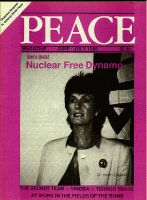
Peace Magazine Jun-Jul 1988, page 6. Some rights reserved.
Search for other articles by Shirley Farlinger here
The pale blue United Nations flag still flies outside the marble-halled Palais des Nations. In March, women from seventeen countries, including Canada's Voice of Women (VOW) met in the former League of Nations building in Geneva. This was followed by VOW visits to missions of the countries on the Conference for Disarmament (C.D.), the most important multilateral body negotiating disarmament. Janis Alton of VOW organized the Canadian delegation.
We stayed in what the Swiss call La Protection Civile, a 1950s bomb shelter - rooms with no view. The windowless cement hallway housed rows of iron bunk beds for ninety nuclear survivors and included a kitchen and dining space. Compared with nuclear war, what is claustrophobia? The Marines would have approved our style as we stormed Out of the bomb shelter each morning.
We shared our news: Sweaters made of Soviet and American wool can be ordered from Peace Fleece (RFDT, Box 57, Kezar Falls, Maine 04047. Phone 207/625-4906); Sweden has submitted a conversion study to the U.N. (All governments at the U.N. Disarmament and Development Conference promised to do so.); a USSR factory has converted from making missiles to baby prams.
After twenty six years, the C.D. may produce its first agreement, a Chemical Weapons Convention (CWC). The convention would ban the production and stockpiling of chemical weapons. It would involve the most detailed verification plan of any multilateral treaty yet devised, with an International Inspectorate of civil servants from all nations party to the treaty. This inspectorate would check chemical weapons factories and destruction plans without prior notice.
In the plenary debate, the Dutch representative pointed out that in the Gulf War, chemicals have been used. Fifteen countries possess or seek to acquire them. (Within days of his talk, 5000 Kurds are decimated - of chemical genocide.)
The U.S. representative, Mr. Freidersdorf, was full of praise for his nation's part in creating a new risk reduction centre.
The USSR responded that confidence measures do not stop the arms race. "To free the world from weapons, we need to negotiate more vertical reduction," he said.
"Our security will never be negotiable, "the U.S. replied.
"I'm surprised, because without negotiation there will be no solutions," said the USSR.
"I'm surprised you're surprised," said the U.S.
We had sessions at the missions of India, China, Mexico, the U.S.., the USSR, Sweden, the U.K., Norway, Australia, and Canada. The countries fall into three groups. The U.S., U.K., and Canada support the theory of nuclear deterrence. Australia, Mexico, Sweden, India, Norway, and the USSR oppose it. China will retain a "small nuclear deterrent" until the superpowers reduce theirs.
On chemical weapons Ms. Mannix of U.S. said, "We have a no first use policy, but if chemical weapons were used, we would use just enough to force the enemy to put on their heavy protective gear. This will deter them."
We were struck by a statement of Mexico, a country without U.S. bases or cruise testing. "We don't belong to any alliance. We are a free country. It would be a very, very good step for any country to withdraw from NATO. When you agree to an alliance, you give a little of your sovereignty."
The head of the Canadian mission, M. de Montigny Marchand, supported "building up to build down" in chemical, as well as nuclear, weapons. Yet, at our final talks, the Canadians showed a flicker of recognition that it may have been a mistake to agree to binary weapons when six NATO countries strongly objected.
As we bolt the armored door on our bomb shelter for the last time, we know we've taken a stand against global madness.
Shirley Farlinger is an Associate Editor of PEACE.

Peace Magazine Jun-Jul 1988, page 6. Some rights reserved.
Search for other articles by Shirley Farlinger here